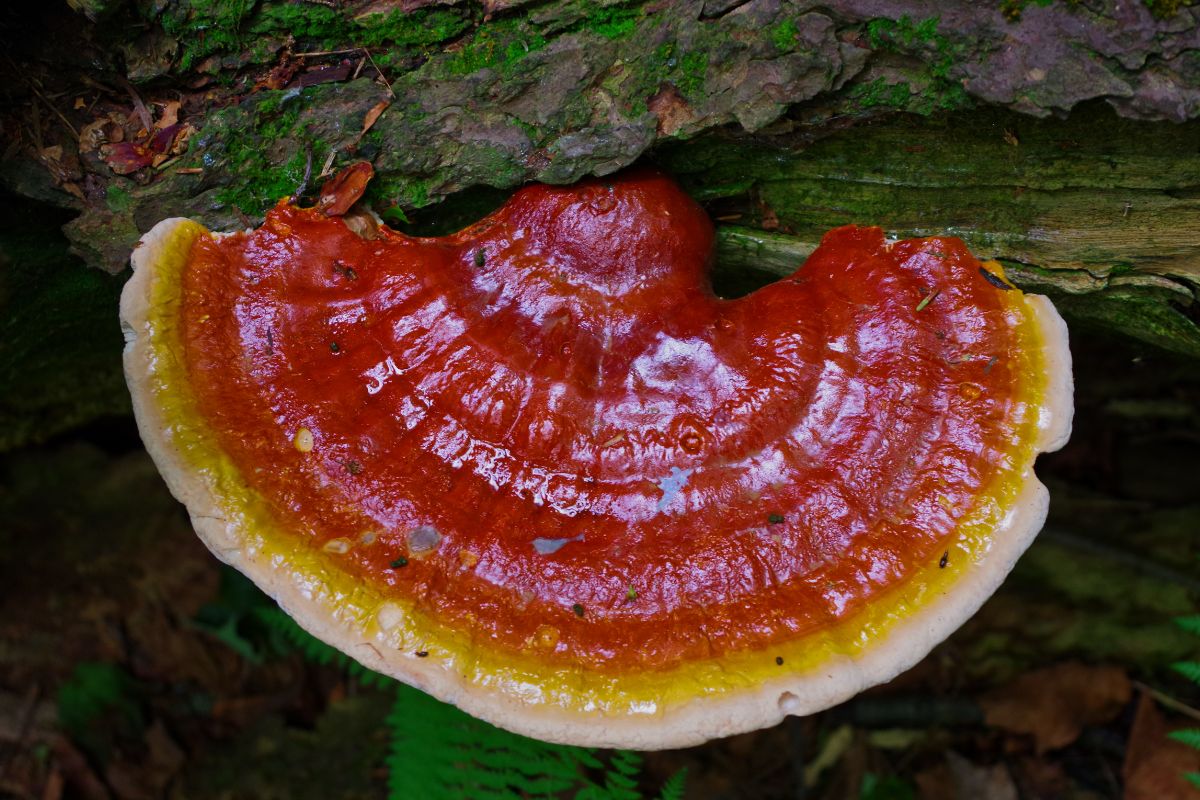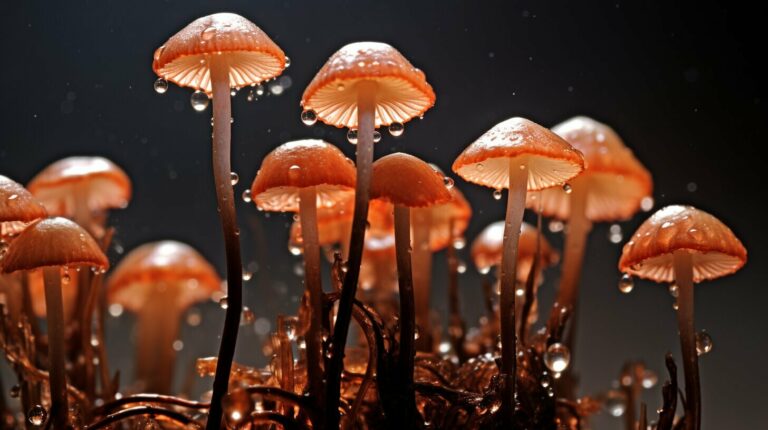Reishi mushrooms, scientifically known as Ganoderma lucidum, have long been prized for their numerous health benefits, including immune system support and cancer-fighting properties. Another lesser-known advantage of these mushrooms is their potential to improve sleep quality. Recent studies reveal that Reishi mushrooms may positively influence sleep patterns, making them a promising option for people struggling with sleep disorders or seeking to achieve a more restful night’s sleep.
Extensive research into the effects of Reishi mushrooms on sleep has unveiled several underlying mechanisms responsible for their sleep-promoting properties. One study found that a Ganoderma lucidum extract could prolong sleep time in rats, particularly affecting non-rapid eye movement (NREM) sleep. Another study discovered that Reishi mushrooms could enhance sleep through a gut microbiota-dependent and serotonin-involved pathway.
These findings suggest that incorporating Reishi mushrooms into one’s diet might offer a natural alternative to pharmacological treatments for sleep-related problems. As more research is conducted, the scope of Reishi mushrooms’ sleep-promoting potential continues to expand, offering hope for those seeking an effective, natural remedy for better sleep.
The Basics of Reishi Mushroom
Table of Contents
| Characteristic | Description |
|---|---|
| Scientific Name | Ganoderma lucidum |
| Common Names | Reishi Mushroom, Lingzhi Mushroom |
| Appearance | Shiny, reddish-brown cap with a woody stem |
| Habitat | Often found growing on hardwood trees, worldwide |
| Culinary Use | Bitter taste and tough texture, not commonly used in cooking |
| Medicinal Uses | Traditional use in Chinese and Japanese medicine for immune support, stress reduction, and overall well-being |
| Active Compounds | Ganoderic acids, polysaccharides, triterpenoids, and other bioactive compounds |
| Health Benefits | Potential immune modulation, anti-inflammatory effects, and antioxidant properties |
| Commercial Forms | Available as extracts, capsules, teas, and tinctures |
| Safety and Precautions | Generally considered safe, but consult a healthcare professional before use, especially if taking medications |
Reishi mushrooms, scientifically known as Ganoderma lucidum, are medicinal mushrooms that have been used in traditional Chinese medicine for thousands of years. These mushrooms are valued for their potential health benefits, such as immune support and aiding in relaxation and better sleep.
One of the reasons why reishi mushrooms are being studied for their influence on sleep is due to their high content of bioactive compounds, such as triterpenes, polysaccharides, and peptides. These compounds, particularly the triterpenes, have been shown to have potential sedative effects and may promote better sleep quality. In fact, a study on rats found that Ganoderma lucidum extract prolonged sleep time and influenced slow-wave sleep or REM sleep in the subjects.
It is important to note that while there is evidence pointing to the benefits of reishi mushrooms for improving sleep, more extensive research is required to confirm these findings. Individuals looking to incorporate reishi mushrooms into their daily routine should strive to find high-quality, organic products from credible sources to ensure the best results and minimize potential risks.
Reishi mushrooms can be consumed in various forms, such as extracts, teas, or supplements. In addition, they can easily be incorporated into different recipes, making it convenient for individuals to benefit from its potential sleep-inducing properties.
In conclusion, the reishi mushroom, a renowned medicinal fungi, holds promise for those seeking a natural and traditional method to improve their sleep quality. As with any supplement, it is advisable to consult with a healthcare professional before incorporating reishi mushroom products into one’s daily routine.
Reishi Mushroom and Immune System
| Aspect | Description |
|---|---|
| Immunomodulation | Reishi mushrooms are known for their potential to modulate or regulate the immune system, helping to maintain balance. They can enhance the activity of immune cells, such as T cells and macrophages, to improve the body’s defense mechanisms. |
| Beta-Glucans | Reishi mushrooms contain beta-glucans, which are polysaccharides known to stimulate the immune system. Beta-glucans can enhance the production of immune cells and support immune function. |
| Ganoderic Acids | Ganoderic acids, unique to Reishi mushrooms, may have anti-inflammatory properties. By reducing inflammation, they indirectly support the immune system’s function. |
| Antioxidant Properties | Reishi mushrooms are rich in antioxidants that combat oxidative stress and reduce damage to immune cells. A healthier immune system can result from reduced oxidative stress. |
| Immune Disorders | Some studies suggest that Reishi mushrooms may be beneficial for individuals with immune disorders, such as autoimmune diseases, by helping to regulate immune responses. |
| Adaptogenic Effects | Reishi is considered an adaptogen, which means it can help the body adapt to stress. Chronic stress can weaken the immune system, so Reishi’s stress-reducing properties indirectly support immunity. |
| Clinical Studies | Research is ongoing to better understand how Reishi mushrooms affect the immune system and their potential in supporting overall health. While promising, more studies are needed for conclusive evidence. |
| Safety Precautions | Generally considered safe, but consult a healthcare professional before using Reishi, especially if you have underlying health conditions or are taking medications. |
Reishi mushrooms are well-known for their potential effects on the immune system. They contain various bioactive compounds, such as polysaccharides, which contribute to their immune-boosting properties. The immunomodulating effects of reishi mushrooms can help support and balance immune function.
One of the key components of reishi mushrooms is their high content of polysaccharides, particularly beta-glucans. These complex sugar molecules have been shown to support immune function by stimulating the production and activity of immune cells, such as macrophages and natural killer cells. As a result, the immune system can function more efficiently in fighting off infections and diseases.
Moreover, reishi mushrooms can also help reduce inflammation in the body. Chronic inflammation is often linked to a weakened immune system, as it can cause immune cells to become less responsive to threats. By reducing inflammation, reishi mushrooms can potentially enhance the overall functionality of the immune system.
In addition to their immune-modulating effects, reishi mushrooms can also exhibit antioxidant properties. Antioxidants play an essential role in protecting the body from harmful free radicals, which can cause damage to cells and contribute to the aging process. By neutralizing these free radicals, antioxidants in reishi mushrooms may help maintain the integrity of immune cells and support overall immune function.
In conclusion, reishi mushrooms can have a significant impact on the immune system, thanks to their rich content of polysaccharides and antioxidant compounds. By supporting immune function, reducing inflammation, and protecting against free radical damage, reishi mushrooms can be a valuable addition to a well-balanced diet for promoting optimal overall health.
Understanding Sleep and Reishi Mushrooms
| Aspect of Sleep | Reishi Mushroom’s Influence | Explanation |
|---|---|---|
| Sleep Quality | Improved | Reishi mushrooms may promote deeper and more restful sleep, leading to better sleep quality. |
| Sleep Duration | Regulated | Reishi may help regulate sleep patterns, promoting a balanced duration of both rapid eye movement (REM) and non-REM sleep cycles. |
| Insomnia Relief | Beneficial | Reishi’s calming properties may alleviate symptoms of insomnia by reducing anxiety and promoting relaxation. |
| Stress Reduction | Significant | Reishi mushrooms contain adaptogenic compounds that can help reduce stress and anxiety, contributing to better sleep. |
| Immune Support | Enhanced | A strengthened immune system from Reishi may help the body fend off illnesses that could disrupt sleep. |
| Circadian Rhythm | Modulation | Reishi may support the body’s internal clock, aiding in the synchronization of sleep-wake cycles. |
| Melatonin Production | Mild Enhancement | Reishi may promote the natural production of melatonin, a hormone crucial for regulating sleep-wake cycles. |
| REM Sleep | Potential Enhancement | Some studies suggest that Reishi may enhance the duration and quality of REM sleep, important for cognitive function. |
| Sleep Disorders | Supportive | Reishi may offer complementary support for managing sleep disorders like sleep apnea and restless legs syndrome. |
| Dream Intensity | Varied Effects | Some individuals report more vivid dreams when taking Reishi, which can be influenced by personal sensitivity. |
Sleep is a vital process for maintaining overall health and well-being. It consists of several phases: REM (rapid eye movement) sleep, non-REM (NREM) sleep, and slow-wave sleep. Throughout the night, our bodies cycle through these stages in a repeating pattern known as the sleep cycle. A healthy sleep cycle consists of multiple transitions between REM and NREM sleep, allowing for both deep relaxation and restoration of the body and mind.
Unfortunately, many individuals struggle with insomnia and other sleep disorders, which can lead to irregular sleep patterns, extended sleep latency, or difficulty falling asleep and staying asleep. Disruptions in the circadian rhythm can also affect sleep quality, causing individuals to experience insomnia or chronic fatigue.
Reishi mushrooms, a traditional Chinese medicine ingredient, have long been used for their potential effects on improving sleep quality and reducing stress. These mushrooms contain beneficial compounds that may positively impact the sleep cycle and address some of the underlying causes of sleep disturbances. Additionally, reishi mushrooms are considered a natural sleep aid, posing a lower risk of side effects compared to some over-the-counter or prescription sleep medications.
Some studies have found that supplementing with reishi mushroom extract can help reduce anxiety and improve sleep quality. The potential effects of reishi mushrooms on sleep may be due to their ability to modulate the levels of stress hormones in the body, enhance immune function, and promote relaxation of the nervous system.
Incorporating reishi mushrooms into one’s daily routine may offer a natural approach to improving sleep quality and addressing sleep-related concerns. By supporting a more balanced sleep cycle and promoting relaxation, these mushrooms may provide an effective and holistic way to achieve better sleep and, consequently, a healthier lifestyle.
It is important to remember that while reishi mushrooms show promise in improving sleep, individual results may vary, and it is always best to consult with a healthcare professional before starting any new supplement or treatment strategy. Making lifestyle changes, such as establishing a consistent sleep schedule, creating a relaxing bedtime environment, and practicing good sleep hygiene, can also contribute to improved sleep quality and overall well-being.
The Effect of Reishi Mushroom on Anxiety and Stress
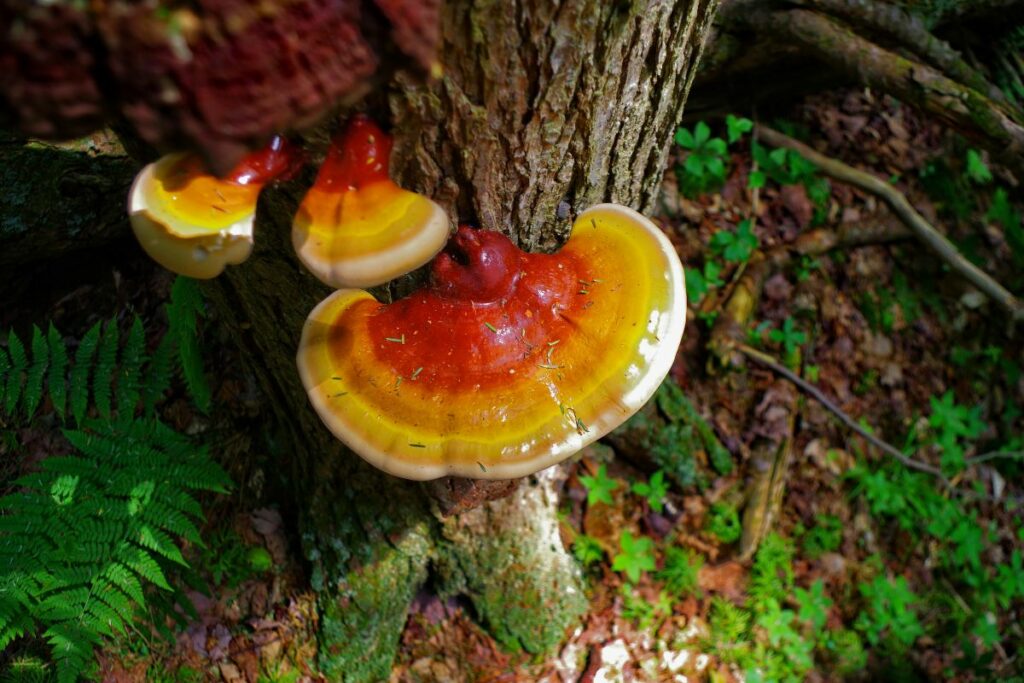
Reishi mushroom, also known as Ganoderma lucidum, has been used traditionally for its potential health benefits. It is believed to have a positive impact on stress, anxiety, and sleep quality. Research has shown that supplementing with reishi mushroom extract can help reduce anxiety levels and improve sleep quality in individuals experiencing stress 1.
The ability of reishi mushroom to reduce anxiety and stress may be attributed to its adaptogenic properties. Adaptogens are natural substances that help the body maintain homeostasis and cope with various stressors. They work by modulating physiological functions and supporting well-being. Reishi mushroom has been found to decrease cortisol levels, a stress-related hormone, in the body 2. Lower cortisol levels can help alleviate anxiety and promote a sense of relaxation.
Another important aspect of reishi mushroom’s impact on anxiety and stress is its effect on serotonin levels. Serotonin plays a crucial role in regulating mood and well-being. Imbalances in serotonin levels can lead to mood disorders such as anxiety and depression. The compounds found in reishi mushroom have been shown to increase serotonin levels, thereby promoting a sense of calm and well-being 3.
In conclusion, reishi mushroom has demonstrated potential benefits in managing stress and anxiety by modulating cortisol and serotonin levels. This adaptogenic mushroom not only supports mental well-being but also enhances sleep quality, making it a valuable option for those looking for a natural solution to improve their overall stress response and emotional health.
The Role of Reishi Mushroom in Metabolic Health
Reishi mushrooms, also known as Ganoderma lucidum, have been traditionally used for their potential health benefits, including improving sleep and promoting metabolic health. This fascinating fungi may positively impact blood sugar, blood pressure, obesity, and diabetes management, contributing to overall well-being.
In terms of blood sugar management, studies have demonstrated that Reishi mushroom extracts can improve glucose tolerance and insulin sensitivity. This effect can be especially beneficial for those with diabetes or prediabetes, as it aids in regulating blood sugar levels and potentially minimizing the risk of complications related to high blood sugar.
Reishi mushrooms may also help with blood pressure regulation, a crucial aspect of metabolic health. Hypertensive individuals often have a higher risk of developing heart diseases and strokes. Though research is still ongoing, preliminary findings indicate that Reishi might assist in reducing blood pressure, thereby supporting cardiovascular health.
Another vital area where Reishi mushrooms appear to have a positive impact is obesity management. Research suggests that extracts of this remarkable fungus can contribute to weight loss and reduction of fat accumulation in animal studies. While more research is needed to confirm these results in humans, the potential metabolic benefits of Reishi mushrooms on obesity should not be overlooked.
In conclusion, incorporating Reishi mushrooms into a balanced diet may offer numerous benefits for metabolic health, including support for blood sugar and blood pressure regulation, as well as obesity management. However, it is essential to remember that Reishi mushrooms should not be used as a standalone treatment for these conditions but rather as a complement to traditional medical therapies and a healthy lifestyle.
The Relationship between Reishi Mushroom and Cancer
Reishi mushrooms, scientifically known as Ganoderma lucidum, have been used in traditional medicine for centuries due to their potential health benefits. One area of interest is the potential use of reishi mushrooms in cancer treatment.
Beta-glucans, naturally occurring polysaccharides found in reishi mushrooms, are known to possess immunomodulating effects. They stimulate the immune system, which may help the body to fight against cancer cells more effectively. Research on the immunomodulating effects of reishi mushrooms reveals promising outcomes in improving immune system function, particularly in prostate cancer patients.
Antioxidants are another compound found in reishi mushrooms that may have a positive impact on cancer treatment. These compounds neutralize free radicals in the body, which can cause cellular damage and potentially lead to cancer development. Reishi mushrooms have been reported to show hypolipidemic and antioxidant effects, suggesting a possible role in reducing the risk of cancer.
Although reishi mushrooms show potential benefits in relation to cancer, it is essential to note that current research is limited and further studies are required to fully understand their role in cancer treatment. Some studies have reported mild side effects, such as nausea or insomnia, in individuals taking reishi mushroom supplements. It is always important to consult with a healthcare professional before incorporating any supplement into a treatment plan.
The Health Risks of Reishi Mushroom
Reishi mushrooms, also known as Lingzhi, are a popular natural remedy used for a variety of health benefits, including improving sleep. However, it’s important to be aware of the potential risks and side effects associated with using this powerful medicinal mushroom.
One of the most common side effects of Reishi mushroom consumption is an upset stomach, which may manifest as nausea or diarrhea. These gastrointestinal disturbances are generally mild and subside after a period of adjustment as the body acclimates to the Reishi extract. Consumption of Reishi mushrooms has also been associated with minor sleep disturbances, such as insomnia, particularly in individuals who are sensitive to its stimulating properties [1].
More severe side effects are quite rare but worth mentioning for the sake of caution. Some individuals may experience skin rashes or allergies as a result of using Reishi mushrooms. It is crucial to discontinue use and consult a healthcare professional should any adverse reactions occur.
Moreover, there have been some concerns about the potential for liver toxicity with long-term use of Reishi mushrooms. Although rare, cases of liver damage have been reported in association with excessive consumption of Reishi mushroom supplements. Users should exercise caution and always follow recommended dosage guidelines in order to minimize the risk of toxicity [2].
Additionally, while Reishi mushrooms generally possess low acute toxicity, further long-term studies on their safety for human consumption are necessary. Pregnant or breastfeeding women, as well as individuals with pre-existing liver conditions or those taking medications metabolized by the liver, should consult their healthcare provider before introducing Reishi mushrooms into their wellness routine.
In conclusion, while the Reishi mushroom offers many potential benefits for improving sleep and overall health, it is not without risks. Users should be aware of potential side effects and exercise caution to ensure a safe and beneficial experience.
The Medicinal Significance of Reishi Mushroom in Traditional Chinese Medicine
Reishi mushroom, scientifically known as Ganoderma lucidum, has been a vital component of Traditional Chinese Medicine (TCM) for centuries. As a medicinal mushroom, it is highly regarded for its various health benefits, particularly in promoting overall wellness and improving sleep quality.
In Eastern medicine, Reishi is commonly prescribed by herbalists to alleviate insomnia and other sleep-related disorders. It is believed that the mushroom’s tranquilizing effects help regulate sleep patterns and improve restfulness. According to a study conducted on mice, Ganoderma lucidum was observed to promote sleep through a gut microbiota-dependent and serotonin-involved pathway, further confirming its potential role in enhancing sleep quality.
Aside from its sleep-promoting properties, Reishi mushroom is widely recognized for its immune-modulating and anti-inflammatory effects. It is also believed to support the kidney and liver functions, which are essential for maintaining overall health and vitality in TCM. For this reason, Reishi mushroom has gained a reputation as a potent adaptogen, helping the body to adapt and resist various stressors.
Another interesting aspect of Reishi in Chinese medicine is its potential to improve cardiovascular health. A clinical study conducted on elderly patients with insomnia and palpitations showed that the regular intake of Ganoderma lucidum resulted in improved sleep patterns as well as cardiovascular health.
In summary, Reishi mushroom holds significant medicinal value in Traditional Chinese Medicine, primarily due to its sleep-enhancing, immune-supporting, and adaptogenic properties. Its multifaceted role in promoting overall wellness makes it a highly esteemed and widely utilized medicinal mushroom in Eastern medicine.
Reishi Supplementation: Dosages and Forms
| Form | Dosage | Frequency | Notes |
|---|---|---|---|
| Reishi Mushroom Extract Capsules | 500 mg to 1500 mg | Once or twice daily | Follow product label instructions. |
| Reishi Mushroom Powder | 1 to 2 grams | 1 to 3 times per day | Can be mixed with water, tea, or food. |
| Reishi Mushroom Tincture | 1 to 2 droppers (1 ml each) | 1 to 3 times per day | Dilute in water or juice if preferred. |
| Reishi Mushroom Tea | 1 to 2 tea bags or 1 tsp | 1 to 3 times per day | Steep in hot water for 5-10 minutes. |
| Reishi Mushroom Dual-Extract Liquid | Follow product label | As directed | Usually concentrated, follow dosage. |
Reishi mushroom supplements are a popular choice for those seeking to improve their sleep quality and overall health. These supplements come in various forms, including powders, capsules, and teas. The choice of form and dosage can depend on the individual’s preferences and needs.
Reishi powders are highly versatile, as they can be mixed into smoothies, hot beverages, or even sprinkled over food. The recommended dosage for reishi powder is typically between 1 to 1.5 grams per day, taken in two or three divided doses throughout the day. When incorporating reishi powder into your diet, it is essential to start with a lower dosage and gradually increase to the recommended amount.
Capsules are another common way to take reishi supplements, providing a convenient and precise method of consumption. The usual dosage for reishi capsules is around 500 to 1,500 milligrams per day, again taken in divided doses. Just like with the powder, it is advisable to begin with a lower dosage and work your way up as needed.
Additionally, reishi mushroom teas have become increasingly popular. To prepare the tea, steep dried or powdered reishi in hot water for 5 to 10 minutes. You can then enjoy this calming beverage before bedtime to support restful sleep. Typical recommendations suggest consuming one to two cups of reishi tea daily.
It is essential to note that while reishi mushroom supplements are generally considered safe for most individuals, some side effects may occur, such as stomach upset, dizziness or skin irritation. It is always recommended to consult a healthcare professional before starting any new supplement, particularly if you have any pre-existing medical conditions or are taking medications.
In conclusion, reishi supplements can be consumed in various forms and dosages to support better sleep and overall health. Start with a lower dosage and gradually increase to the recommended amount while monitoring your body’s response. And always consult a healthcare professional if you have any concerns or uncertainties.
Interactions of Reishi Mushroom with Medications
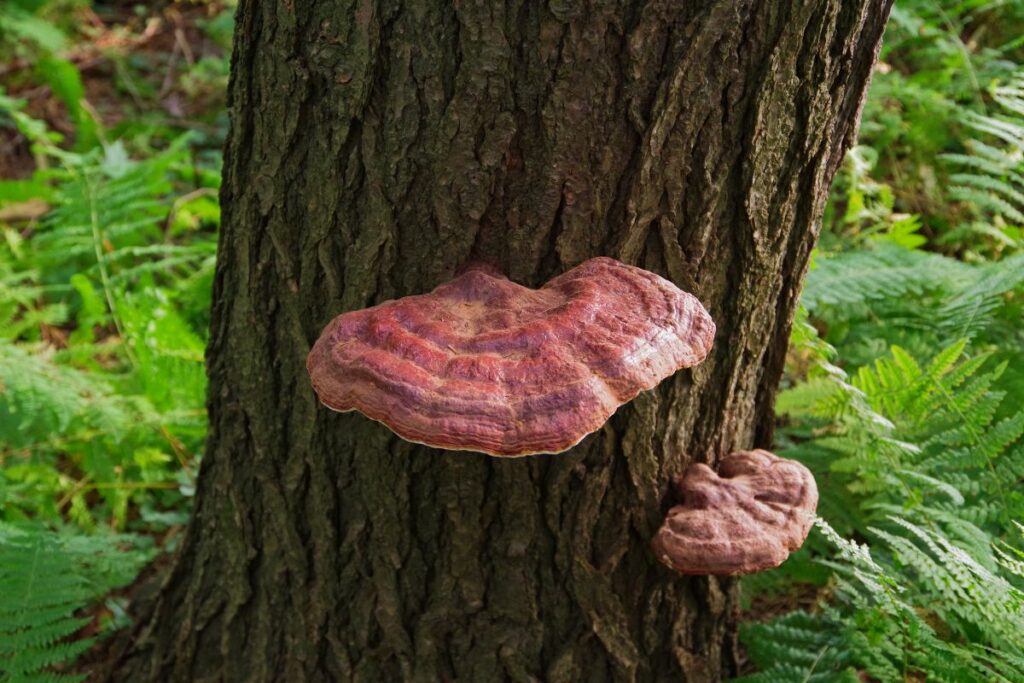
Reishi mushroom, a popular natural remedy, is often used for its potential sleep-promoting benefits. However, it is essential to be aware of possible interactions with medications before incorporating Reishi into your sleep routine.
Reishi mushroom has been found to interact with certain drugs, particularly those that affect the immune system and blood clotting. For example, it can potentially enhance the effects of antiplatelet and anticoagulant medications, leading to an increased risk of bleeding. Therefore, it is crucial to consult with a healthcare professional before combining Reishi with such medications 1.
As for sleep aids, it is not uncommon for people to combine Reishi mushroom with other natural remedies such as melatonin and valerian root. Although there are no specific studies on the interactions between Reishi mushroom and these supplements, it is generally advised to exercise caution when combining multiple sleep aids.
This is because using multiple supplements together might cause excessive drowsiness, which could affect one’s ability to perform daily tasks safely. Additionally, it is important to note that supplements can sometimes interact with medications, creating unwanted effects 2.
To ensure the safe use of Reishi mushroom or any other sleep aid, it is always recommended to consult with a healthcare professional, especially if you are taking prescription medications or have pre-existing health conditions.
In conclusion, while Reishi mushroom is a promising natural remedy for sleep, one must be cautious of its potential interactions with medications. It is essential to seek professional advice before incorporating Reishi mushroom or any supplement into your routine, especially when combining with other sleep aids or prescription drugs.
Examining the Scientific Evidence: Human Studies
When exploring the potential benefits of reishi mushroom for sleep, it’s essential to examine the available scientific evidence from human studies. In particular, a narrative review reported that some clinical trials observed an increase in sleep quality for participants who consumed medicinal mushrooms like Ganoderma lucidum. However, it is necessary to consider the specific extracts and preparations involved in these studies, as their bioactive components might differ.
Although no direct human studies are currently available that focus solely on reishi mushroom’s effects on sleep, the Cochrane review noted that one study assessing Ganoderma lucidum as a cancer treatment mentioned minimal side effects, including insomnia. This observation does not necessarily imply that reishi mushroom causes sleep disturbances, but it is an important aspect to consider when evaluating its safety and potential benefits.
Furthermore, some research suggests that the sleep-promoting effects of reishi mushroom may be mediated through its impact on the gut microbiota and serotonin pathways. A study on mice reported the sleep promotion effects of Ganoderma lucidum, but the generalizability of these findings to humans is limited.
In conclusion, while there is evidence suggesting that Ganoderma lucidum may improve sleep quality in some cases, the current scientific literature is limited in terms of human studies specifically investigating reishi mushroom and sleep. Further research is warranted to establish a clearer understanding of the potential sleep-enhancing benefits of reishi mushroom and the underlying mechanisms involved in these effects.
Functional Mushrooms and Health
Functional mushrooms, such as the reishi mushroom, have been gaining popularity for their potential health benefits. Reishi mushroom (Ganoderma lucidum) is a species of fungus commonly used in traditional Chinese and Japanese medicine. It is often recommended for a variety of ailments, including sleep disorders like insomnia 1.
Reishi mushrooms contain compounds known as triterpenoids, polysaccharides, and peptidoglycans. These bioactive substances are believed to contribute to the mushroom’s health benefits, some of which include enhancing immune function, reducing inflammation, and promoting overall well-being 2.
One of the key benefits of reishi mushrooms is their potential effect on sleep quality. Studies have found that supplementing with reishi mushroom extract can help reduce anxiety and improve sleep quality in healthy individuals 3. Ganoderma lucidum has also been used to treat sleep disorders, such as insomnia, in traditional medicine 4.
Apart from the potential impact on sleep, reishi mushrooms may provide other health benefits as well. Some studies suggest that Ganoderma lucidum could support liver function, help maintain healthy blood sugar levels, and provide antioxidant effects 5. However, it is important to note that more research is needed to confirm these claims and determine the optimal dosage for each individual.
In summary, functional mushrooms like the reishi mushroom offer potential health benefits, including the improvement of sleep quality. However, it is essential to consult with a healthcare professional before incorporating reishi mushrooms into your daily routine, especially if you have pre-existing medical conditions or take medications that may interact with the mushroom’s compounds.
Reishi Mushroom in Natural Remedies
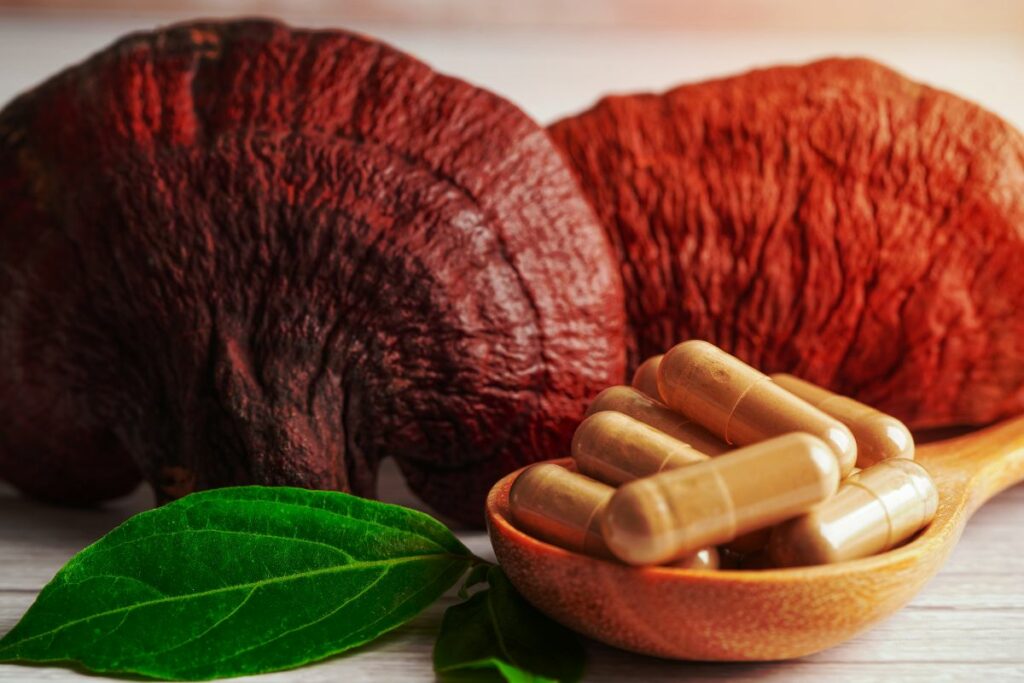
Reishi mushrooms have been used as a natural remedy in traditional Chinese and Japanese medicine for centuries. One of their notable applications is for promoting sleep and maintaining healthy sleep patterns. Their sleep-promoting factor has been recognized by herbalists who often recommend Reishi mushrooms for insomnia.
In addition to being effective for sleep, Reishi mushrooms are part of a group known as medicinal mushrooms that have various health benefits. Medicinal mushrooms for sleep aren’t the only type of natural remedies used to address sleep issues, but they are certainly worth considering as a potential method of improving sleep quality.
Studies have shown that Reishi mushroom extract can have a positive impact on sleep patterns, particularly non-REM sleep, which accounts for around 80 percent of adult human sleep. When Reishi extract was withdrawn, nocturnal non-REM sleep increased, suggesting its potential as a sleep aid.
The use of Reishi mushrooms for sleep is supported by their minimal side effects in comparison to traditional sleep medications. Some reported side effects of Ganoderma lucidum treatment include nausea and insomnia, but these occurrences are generally rare.
In conclusion, Reishi mushrooms have stood the test of time in their use as part of natural remedies for sleep in traditional medicine practices. While they may not be the only option, their potential benefits and minimal side effects make them a promising alternative for those seeking to improve their sleep quality.
Role of Mushrooms in Gut Health
Reishi mushrooms have been known to offer numerous health benefits, including support for gut health. These mushrooms contain bioactive compounds that can contribute to the balance and well-being of the gut microbiota. The gut microbiota is the community of microorganisms living in our digestive system and plays a vital role in maintaining our overall health.
One of the key benefits of reishi mushrooms for gut health is their prebiotic properties. Prebiotics are substances that help nourish and stimulate the growth of beneficial bacteria in the gut. The polysaccharides found in reishi mushrooms are considered to be natural prebiotics, supporting the growth of good bacteria and promoting a healthy gut environment.
In addition, reishi mushrooms can have a positive impact on gut motility and function. Some studies have shown that Ganoderma lucidum, the scientific name for reishi mushrooms, can improve gut transit time and alleviate constipation. This can lead to better nutrient absorption and a reduction in gastrointestinal issues such as bloating or discomfort.
Moreover, the compounds present in reishi mushrooms can help in maintaining the integrity of the gut lining. A healthy gut lining is crucial in preventing the passage of harmful substances into the bloodstream. By supporting the gut lining, reishi mushrooms may play a role in reducing inflammation and promoting general gut health.
The effects of reishi mushrooms on gut health can also have an indirect influence on sleep quality. A well-functioning gut is linked to better mood and reduced stress levels, which in turn lead to improved sleep. Including reishi mushrooms in your diet might contribute to a more balanced gut microbiota and overall better sleep and well-being.
In summary, reishi mushrooms have multiple properties that can benefit gut health. By promoting a balanced gut microbiota and supporting the gut lining, these fungi can contribute to better gastrointestinal function and optimal overall health.
Frequently Asked Questions
What are the benefits of reishi mushroom tea for sleep?
Reishi mushroom tea has been traditionally used to promote sleep and relaxation. Reishi, scientifically known as Ganoderma lucidum, contains compounds that may help improve sleep quality by reducing anxiety and promoting a sense of calmness. It’s important to note that the effect of reishi mushroom tea for sleep is mild and may vary depending on individual factors. To enjoy the benefits, simply steep dried reishi mushrooms in hot water for a soothing bedtime drink.
How does reishi mushroom coffee affect sleep?
Reishi mushroom coffee is a blend of ground coffee beans and reishi mushroom extract. Although coffee is known for its stimulant effects, the addition of reishi extract may counteract these effects and promote relaxation, making it a suitable option for those who want to enjoy coffee without negatively affecting their sleep. However, individual reactions to caffeine and reishi can vary, so it’s essential to monitor the potential impact on your sleep when trying reishi mushroom coffee for the first time.
What is the optimal dosage of reishi for better sleep?
The optimal dosage of reishi for improving sleep has not been established through clinical research. Most studies and traditional practices use a range between 1.5 and 9 grams of dried reishi mushroom daily. It’s advised to start with a modest amount and then adjust based on personal experience and tolerance. If you’re using a supplement, follow the manufacturer’s instructions and consider consulting a healthcare professional for personalized advice.
Are there any side effects of taking reishi mushroom for sleep?
Reishi mushroom is generally considered safe for most people when taken in appropriate amounts. However, some individuals might experience side effects like digestive discomfort, dry mouth, or dizziness. Pregnant or breastfeeding women, people with blood clotting disorders, and those on certain medications should consult their healthcare providers before using reishi for sleep or other health purposes.
How does reishi mushroom extract compare to other mushrooms for sleep?
Different medicinal mushrooms have varying properties that can support relaxation and sleep. Reishi mushroom is known for its tranquilizing effects, while other mushrooms like Chaga and Lion’s Mane might have more of a focus on cognitive function and stress relief. It’s essential to note that the effects of these mushrooms can vary from person to person, and comparing their efficacy requires understanding individual needs and preferences.
What is the best time to consume reishi for improving sleep?
The best time to consume reishi for improving sleep is in the evening, a few hours before bedtime. Drinking reishi mushroom tea or taking a reishi supplement at this time can help your body wind down and prepare for sleep. However, the optimal timing may vary based on individual factors, so it’s crucial to experiment and find the best routine that works for you.
Footnotes

